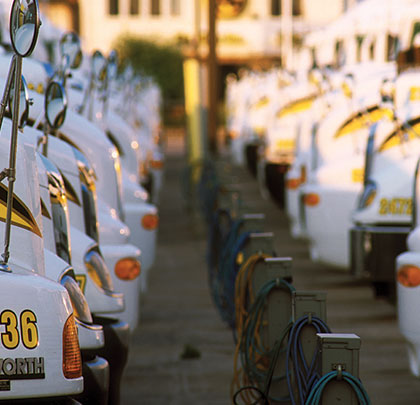Stated by the World Health Organization, “Air pollution is a major environmental risk to health. By reducing air pollution levels we can help countries reduce the global burden of disease from respiratory infections, heart disease, and lung cancer. Urban outdoor air pollution is estimated to cause 1.3 million deaths world-wide per year.”
On September 23, 2014, leaders from around the world met in New York City to discuss the most pressing issue facing our world today: climate change. They recognized climate change as an urgent matter that needs immediate attention and vowed to take steps necessary to reduce harmful emissions.
THE ISSUE
Regardless of regulations, there are inconsistencies within the transportation and construction industries when it comes to emissions priorities. States like California and New York take emissions requirements quite seriously and other states like Florida do not even require annual emissions testing. With the U.S. still in an economic recession, some companies closed their doors while some went through mergers to survive. Many companies do not have the cash flow to replace every engine in their fleet, which is extremely costly and other companies chose to comply by retrofitting their fleet with Diesel Particulate Filters (DPF) only to discover that the DPF technology was more costly than they expected. Not only was there the original investment in the devices and installation, but the ongoing maintenance has definitely been a financial burden. In fact, there are DPF companies that have closed due to the amount of product defects and engine damages occurring in the field. In some cases, new logistical strategies have been implemented so that “dirty” engines are relocated to other states that have lighter emissions regulations. This tactic is not actually reducing emissions at all; it is simply moving the emissions into a different location. In reality, the wind knows no boundaries on this planet. All greenhouse gases that are released into the air affect the air quality worldwide. With all this said, are there other options that are readily available, affordable, and do not add maintenance costs?

MEET THE SOLUTION
Environmental Engines, Inc. (EEI) is dedicated to finding, proving, verifying, and offering real solutions that reduce emissions in engines of all sizes. EEI specializes in energy efficiency solutions with a mission to reduce air pollution AND fuel expenses. A variety of technologies are offered to accommodate the needs of many industries and applications. The primary focus is on internal combustion engines from small personal vehicles to commercial transportation to off road equipment to power generators. In order to achieve superior results for clients and stay years ahead of any competition, EEI has identified several areas of inefficiency within the engine and have combined technologies into Environmental Packages to address the problem areas.
The two primary areas of energy loss that are addressed by EEI products are friction (or heat) and incomplete fuel burn. EEI offers several Environmental Packages for companies looking to reduce emissions, increase performance, and improve fuel consumption.
ENVIRONMENTAL PACKAGES
EEI’s Environmental Packages start with Systems Protection Treatment (SPT), a revolutionary technology in lubrication and metal treatment. It is a proprietary liquid formulation that penetrates itself at a micron level into the metals of the system being treated. SPT is a ceramic-like permanent coating that stabilizes the thermal dynamics of the engine, reduces friction, and substantially reduces emissions. It also removes carbon buildup and moisture from the engine. SPT has been evaluated in extreme temperatures: from -40 C to 1600 C. It has been proven to reduce emissions, increase horsepower, and improve compression. Emissions reductions have been tested by a California Air Resource Board approved laboratory in California with the results* reaching a 92 percent reduction in CO, 72 percent reduction in hydrocarbons (HC), and 31 percent reduction in Nox. A side effect experienced in the field is improved fuel efficiency with varied results. Systems that are targeted for these one-time treatments are the engine, transmission, power steering, turbos, gears, hydraulics, and air conditioners.
In conjunction with systems protections, the Environmental Packages include the DPF Rx, a proven technology in emissions reduction and fuel efficiency improvement for diesel engines (Petrol Rx for gasoline engines). This simple device is a metal tube made up of stainless steel, aluminum, and brass. It is approximately 4 inches in length and 1 inch in diameter and is installed in the fuel line. DPF Rx does NOT contain any chemicals, magnets, or electronics and does not require any maintenance. Ultimately, the DPF Rx atomizes the fuel which stabilizes the fuel rails and improves fuel rail vapor pressure. Smaller fuel particles and an even injector spray allows the fuel to burn more completely in the combustion chamber, enabling the engine to use the fuel for energy instead of becoming waste in the form of emissions. By addressing emissions pre-combustion, there is far less particulate matter to clog up those DPF systems, therefore, saving companies money in 3 ways: 1) Less down time due to DPF regenerations; 2) Fewer regeneration events that the clients do not have to pay for; and 3) Bottom line fuel savings.
The technologies described above are implemented together for greater results than individually. Emissions reductions and fuel savings are experienced within a short period of time, giving our clients a return on investment within a few weeks and up to 6 months (depending on usage). Discover your fuel savings potential at www.environmentalengines.com/
fuel-savings-calculator. ■
*Although laboratory tested, results vary by engine and application.
About The Author
Jennifer Martinez is the president and cofounder of Environmental Engines, Inc. (EEI). The founders of EEI are passionate about providing affordable emissions solutions to the commercial transportation and industrial industries. For more information, visit www.environmentalengines.com, email info@environmentalengines.com, or call 888.304.2744. Determine your savings potential and order your package today. Mention this article for free shipping and a 10% discount on all orders.
Modern Contractor Solutions, December 2014
Did you enjoy this article?
Subscribe to the FREE Digital Edition of Modern Contractor Solutions Magazine!



